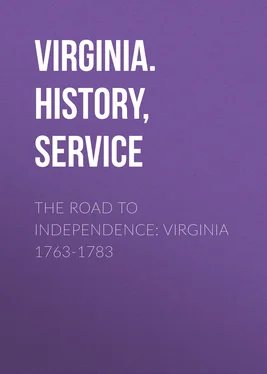Virginia. History, Government, and Geography - The Road to Independence - Virginia 1763-1783
Здесь есть возможность читать онлайн «Virginia. History, Government, and Geography - The Road to Independence - Virginia 1763-1783» — ознакомительный отрывок электронной книги совершенно бесплатно, а после прочтения отрывка купить полную версию. В некоторых случаях можно слушать аудио, скачать через торрент в формате fb2 и присутствует краткое содержание. Жанр: foreign_prose, История, foreign_edu, foreign_antique, на английском языке. Описание произведения, (предисловие) а так же отзывы посетителей доступны на портале библиотеки ЛибКат.
- Название:The Road to Independence: Virginia 1763-1783
- Автор:
- Жанр:
- Год:неизвестен
- ISBN:нет данных
- Рейтинг книги:4 / 5. Голосов: 1
-
Избранное:Добавить в избранное
- Отзывы:
-
Ваша оценка:
- 80
- 1
- 2
- 3
- 4
- 5
The Road to Independence: Virginia 1763-1783: краткое содержание, описание и аннотация
Предлагаем к чтению аннотацию, описание, краткое содержание или предисловие (зависит от того, что написал сам автор книги «The Road to Independence: Virginia 1763-1783»). Если вы не нашли необходимую информацию о книге — напишите в комментариях, мы постараемся отыскать её.
The Road to Independence: Virginia 1763-1783 — читать онлайн ознакомительный отрывок
Ниже представлен текст книги, разбитый по страницам. Система сохранения места последней прочитанной страницы, позволяет с удобством читать онлайн бесплатно книгу «The Road to Independence: Virginia 1763-1783», без необходимости каждый раз заново искать на чём Вы остановились. Поставьте закладку, и сможете в любой момент перейти на страницу, на которой закончили чтение.
Интервал:
Закладка:
The French and Indian War produced a rather curious and very significant by-product: the English literally rediscovered America and Virginia. Since the late 17th Century there had been very little personal contact between Englishmen in authority and the colony. From 1710 to 1750, the years when all was running so well, the only contact Virginia had with English government was through her royal governor. Most of the other royal officials in Virginia were Virginians, not Englishmen. And, as events turned out, even the royal governors were a thin line of communication. Governor Alexander Spotswood (1710-1722) became a Virginia planter rather than go home to Britain; Governor Hugh Drysdale (1722-1726) died in Williamsburg; and Governor William Gooch (1727-1749) served in the colony for 22 years without once visiting England. Moreover, fewer young Virginians were going to England for their schooling, preferring to attend the College of William and Mary or the recently opened College of New Jersey (Princeton). There were, of course, London and Bristol tobacco merchants who knew Virginia well, but the great increase in Virginia wealth after 1720 was partially obscured from Englishmen because it was the Scots merchants, not the English, who came to control much of the Chesapeake tobacco trade.
English politicians and citizens alike had a very incomplete understanding of the great strides made by Virginia. They still thought of Virginians as provincials, struggling in the wilderness, or as impoverished Scots, Irish, and Germans living in the back-country. Hundreds of English military officers, many of whom would achieve positions of political influence in the 1760's and 1770's, were surprised to find Virginia and other American colonies to be economically prosperous, socially mature, and attractive places in which to live. Englishman after Englishman wrote about Virginians who lived in a style befitting English country gentry and London merchants. Over and over again they noted the near absence of poverty, even on the frontier. Their discoveries matched English political needs. Not only was it necessary for the Americans to assume a greater share of the financial burdens, Englishmen now knew they could do it.
These Englishmen also made another major discovery—the colonies were violating the English constitution. They had grown independent of the crown and the mother country. They paid little attention to parliamentary laws and the Navigation Acts; they smuggled extensively and bribed customs officials; and they traded with the enemy in wartime. They had developed political practices which conflicted with the constitution as the British knew it. Legislatures ignored the king's instructions, often refused to support the war efforts until they had forced concessions from the governors, and had taken royal and executive prerogatives unto themselves. Worse yet, royal governors like Robert Dinwiddie and Francis Fauquier yielded to the demands of the House of Burgesses and accepted laws explicitly contrary to their royal instructions. What these Englishmen discovered was the collapse of the imperial system as set forth in the creation of the Board of Trade in 1696. In its place there had been substituted, quite unnoticed by British officials, the House of Burgesses which thought of itself as a miniature House of Commons. 1 1 An excellent summary of the ways in which the Virginia burgesses and their counterparts in North and South Carolina and Georgia quietly gained the upper hand by mid-century, see Jack P. Greene, Quest for Power (University of North Carolina Press, 1963).
Once the British made the discovery about these constitutional changes they quite understandably believed such conditions could not be ignored. Quite understandably, the Virginians were not willing to give up rights and privileges which they believed were theirs, or the semiautonomy they had enjoyed the previous 30 years.
There came to power in the 1760's an entirely new political leadership in England. The most important change was the kingship itself. George II, who had come to the throne in 1727, died in 1760 and was succeeded by his grandson, George III. Unlike his grandfather and his great-grandfather, George I (1715-1727), both of whom were essentially Hanoverians, George III "gloried in the name of Briton" and believed it was essential for the king to be his own "prime" minister and for the king to be active in managing the crown's political affairs in parliament. Unlike the first two Georges, the third George could not achieve the political stability which Robert Walpole and the Duke of Newcastle had imposed on parliament from 1720 to 1754. It is well known that George had a congenital disease which pushed him into periods of apparent insanity during his long reign (he died in 1820). Present day medical scholars now believe that this illness was perhaps porphyria or some type of metabolic illness, which could now be treated and controlled by diet and medication. Such illness does not appear to have been a major factor in his actions prior to the Revolution, the first significant attack not occurring until 1788. Instead, the stolid and often plodding king tended to rely upon men like the unimaginative Lord Bute or his somewhat stodgy wife, Charlotte of Mecklenberg (for whom two Virginia counties and the town of Charlottesville are named.) The breakdown of the once-powerful Whig political coalition also added to the king's problems.
About the time George ascended the throne, the English Whigs who had dominated English politics since 1720 fell victim to their own excesses. Walpole and Newcastle had controlled and directed parliament and the ministry through the "judicious" use of patronage and government contracts and contacts. Nevertheless they had done so with a consistent governmental program in mind and in a period of peace. By the 1760's the Whigs had deteriorated into factions quarreling over patronage, spoils, and contracts, not policy. They became thoroughly corrupt and interested in power primarily for personal gain. Consequently, the king could not find anyone whom he could trust who could also provide leadership and hold together a coalition capable of doing his business in the House of Commons. He tried Whigs George Grenville (1763-1765), Lord Rockingham (1765-1766), Lord Chatham, the former William Pitt (1766-1768), and the Duke of Grafton (1768-1770). Finally, in 1770, he turned to Lord North and the Tories. North held on until 1782.
What these frequent changes suggest is that at the height of the American crisis in the 1760's, when the real seeds of the Revolution were being sown, the instability of the British parliamentary government precluded a consistent and rational approach to American problems. Lacking internal cohesion, the English government could not meet the threat of external division. It also means that the colonists, especially the Virginians, saw parliament as being thoroughly corrupt and the king surrounded by what even the mild-mannered Edmund Pendleton called "a rotten, wicked administration". Not until the eve of independence in 1776 were Virginians to think of George as a tyrant and despot. In fact, he was neither. He was a dedicated man of limited abilities in an age demanding greatness if the separation of the American colonies from the empire was to have been prevented. Perhaps even greatness could not have prevented what some have come to believe was inevitable. (For a sympathetic study, see King George III, by John Brooke, McGraw-Hill, New York, 1972).
Leadership also changed dramatically in Virginia in the 1760's. This was partially due to changing economic conditions. Prosperity did not return as rapidly as expected. The long war probably masked a basic flaw in the Virginia economy which Virginians believed they had solved—they were too reliant on tobacco. The great Virginia fortunes of the mid-18th Century were built on extensive credit from Britain, the efficient operation of the mercantile system, the initiative and enterprise of Scots merchants who had succeeded in marketing in Europe nearly all the tobacco produced by the new planters in the Piedmont and Northern Neck, and by the prudence of the planters themselves.
Читать дальшеИнтервал:
Закладка:
Похожие книги на «The Road to Independence: Virginia 1763-1783»
Представляем Вашему вниманию похожие книги на «The Road to Independence: Virginia 1763-1783» списком для выбора. Мы отобрали схожую по названию и смыслу литературу в надежде предоставить читателям больше вариантов отыскать новые, интересные, ещё непрочитанные произведения.
Обсуждение, отзывы о книге «The Road to Independence: Virginia 1763-1783» и просто собственные мнения читателей. Оставьте ваши комментарии, напишите, что Вы думаете о произведении, его смысле или главных героях. Укажите что конкретно понравилось, а что нет, и почему Вы так считаете.












